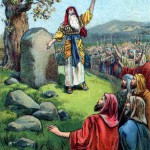Joshua 22-24 (Gilead's Altars, Recap)
And welcome back to the Internet’s greatest Bible commentary, in which Yours Truly reads through the Bible and explains its many mysteries as best my limited education allows. I encourage you to read the Good Book along with me, because my time’s too valuable to write summaries. Here we go!
Today's entry is our grand finale. Stay tuned for another bookend post akin to the one which began this series.
22:10. And they came to the regions of the Jordan, that are in the land of Canaan, and the children of Reuben and the children of Gad and the half-tribe of Manasseh built an altar there by the Jordan, a great altar to look upon.
As Dr. Robert Price would admonish us, the first question we'll ask ourselves about Chapter 23 is the most important: what use did the writer of this passage's contemporary audience have for it? What's its function?
The answer's not difficult: this story explains why, at the time of writing, there existed altars to the LORD in the land of Gilead which matched Jerusalem's in age and grandeur. Their existence and the love of the populace for them is a sticking point for the YWHists, who have said that God desires His worship to be centralized in Jerusalem.
What the writer has come up with is pretty clever. The altars were legally built, but the original intention was never to worship with them. They're just to remind you that you're supposed to be worshiping the LORD over in Jerusalem. So: you don't have to knock 'em down, but don't use 'em!
Chapter 23 is of course "The Story Thus Far". Since the story of Joshua and other important scrolls were not collected in one volume until well after the time of Jesus, it was important to include a summary of previous events within the work.
23:15. And it shall be, that as all the good things that the Lord your God has spoken to you have come to pass, so shall the Lord bring upon you all the evil things, until He has destroyed you from this good land, that the Lord your God has given you.
23:16. When you transgress the covenant of the Lord your God, that He has commanded you, and you will go and serve strange gods and you will bow to them; then the wrath of the Lord will burn against you, and you will perish quickly from upon the good land that He has given you."
This is a reference to Assyria's destruction of Israel and/or Babylon's of Judah. If you're a Christian, you likely believe that this is an example of prophecy; if you have a secular view of the Scriptures, these verses show that the Book of Joshua was either written or revised later than Canaan's foreign domination.
Chapter 24 has some fun working of the crowds by Joshua. "Choose for yourself, People, but I'm going to serve the LORD." "We will, too!" "You? Pfffft. You can't handle it." "Yes, we can! We're going to serve the LORD!" "Alriiiight... Did everyone hear that? You said it, not me."
It's worth pointing out, because I think it's one of the simplest admissions that many evangelical Christians tend not to consider but are willing to make, that "the people" didn't really all say the dialogue ascribed to them here. The author clearly made the words up in order to get across the crowd's sentiments in a stylish way.
24:33. And Eleazar the son of Aaron died; and they buried him in the hill of Phinehas his son, which was given to him in Mount Ephraim.
As previously mentioned in this series, Eleazar should already have died in the desert.
NEXT: An afterword, but I don't blame you if you don't want to stick around. Thanks for reading.
Bible Translation: Judaica Press's Tanach with Rashi commentary, courtesy of Chabad.org.
OTHER POSTS IN THIS SERIES:
This entry was tagged. Bible Commentary Joshua
